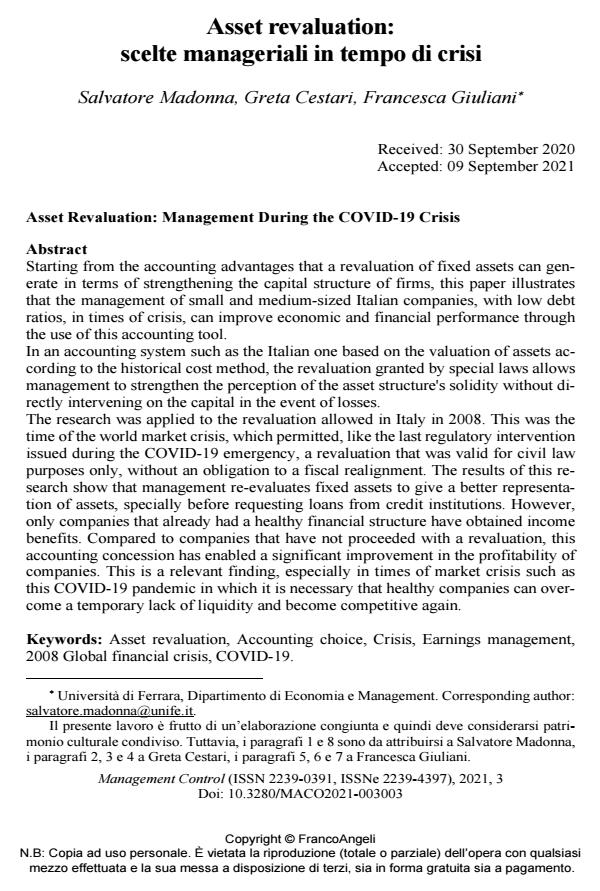Asset Revaluation: Management During the COVID-19 Crisis
Journal title MANAGEMENT CONTROL
Author/s Salvatore Madonna, Greta Cestari, Francesca Giuliani
Publishing Year 2021 Issue 2021/3
Language Italian Pages 24 P. 41-64 File size 298 KB
DOI 10.3280/MACO2021-003003
DOI is like a bar code for intellectual property: to have more infomation
click here
Below, you can see the article first page
If you want to buy this article in PDF format, you can do it, following the instructions to buy download credits

FrancoAngeli is member of Publishers International Linking Association, Inc (PILA), a not-for-profit association which run the CrossRef service enabling links to and from online scholarly content.
Starting from the accounting advantages that a revaluation of fixed assets can generate in terms of strengthening the capital structure of firms, this paper illustrates that the management of small and medium-sized Italian companies, with low debt ratios, in times of crisis, can improve economic and financial perfor-mance through the use of this accounting tool. In an accounting system such as the Italian one based on the valuation of assets according to the historical cost method, the revaluation granted by special laws allows management to strengthen the perception of the asset structure's solidity without directly intervening on the capital in the event of losses. The research was applied to the revaluation allowed in Italy in 2008. This was the time of the world market crisis, which permitted, like the last regulatory interven-tion issued during the COVID-19 emergency, a revaluation that was valid for civil law purposes only, without an obligation to a fiscal realignment. The results of this research show that management re-evaluates fixed assets to give a better represen-tation of assets, specially before requesting loans from credit institutions. However, only companies that already had a healthy financial structure have obtained in-come benefits. Compared to companies that have not proceeded with a revalua-tion, this accounting concession has enabled a significant improvement in the profitability of companies. This is a relevant finding, especially in times of market crisis such as this COVID-19 pandemic in which it is necessary that healthy com-panies can overcome a temporary lack of liquidity and become competitive again.
Keywords: Asset revaluation, Accounting choice, Crisis, Earnings management, 2008 Global financial crisis, COVID-19.
- Le politiche pubbliche a sostegno della crisi da COVID-19 nel settore turistico: un'analisi esplorativa Elisabetta Reginato, Francesca Cabiddu, Patrizia Modica, in MANAGEMENT CONTROL 1/2023 pp.95
DOI: 10.3280/MACO2023-001005 - Le dimensioni della conoscenza aziendale. Profili di investigazione tra crisi pandemica ed economia digitale Rosa Lombardi, in MANAGEMENT CONTROL 3/2021 pp.5
DOI: 10.3280/MACO2021-003001
Salvatore Madonna, Greta Cestari, Francesca Giuliani, Asset revaluation: scelte manageriali in tempo di crisi in "MANAGEMENT CONTROL" 3/2021, pp 41-64, DOI: 10.3280/MACO2021-003003